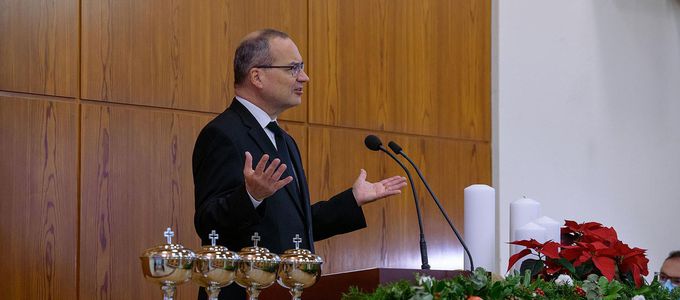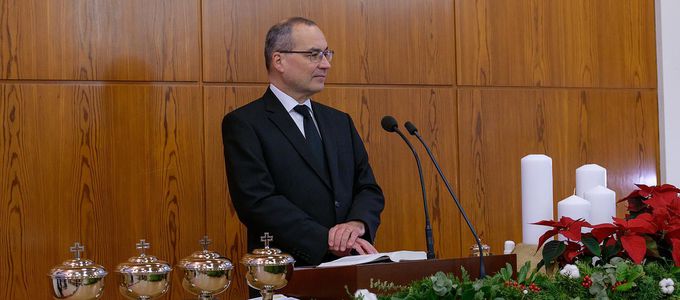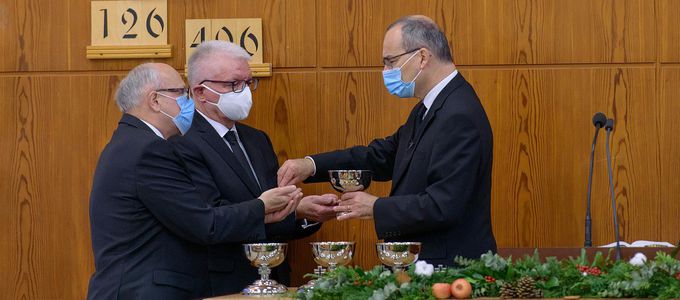
Bühl is a city in south-western Germany, close to the border with France. Even though the Chief Apostle conducted the divine service there on 6 December 2020, his sermon was intended for parts of the English-speaking world.
The pandemic is calling for creative solutions, and because the Chief Apostle cannot travel at the moment, the congregations come to him via internet and TV. This was also the case this time. He conducted his sermon in English for members in South-East Asia and South Africa who joined the service online. He was thrilled by the idea of having a service streamed for congregations in these parts of the world from a congregation that he could get to: “You know that I cannot travel during the pandemic. But I’m still interested in what’s going on in the different countries, what’s going on in Africa, in South-East Asia. Thank God I get reports from the District Apostles, I can read on the internet and so I’m well informed about what’s going on in the different countries, in the different congregations around the world.”
Thank God for salvation
The Bible text the Chief Apostle used was not immediately clear: “Blessed is the Lord God of Israel, for He has visited and redeemed His people, to grant us that we, being delivered from the hand of our enemies, might serve Him without fear, in holiness and righteousness before Him all the days of our life” (Luke 1: 68, 74–75). But it soon became clear what it was all about. Thoughts of the season played into the proclamation: “We thank God that He has not only sent a Saviour to save the world. He is not only the Saviour of the world: Jesus Christ is my Saviour, Jesus Christ is your Saviour,” he began his discourse. “Whatever your past may have been like, whatever your present is like, whoever you are, whatever you have done: you have God the Saviour.”
On the road to the new world
The Chief Apostle asked what salvation actually consists of. Zacharias, the father of John the Baptist, knew and praised God with a hymn, which is recorded in the gospel of Luke (chapter 1: 67–79). “The Saviour came to deliver man from sin, from the power of the evil one and to lead them into eternal fellowship with God.” In this new world of fellowship with God there will be no more suffering, no more death, no more injustice, no more disease, no more poverty. Everything will be perfect. The redeemed will have reason to thank God day and night: “We will find a new reason to worship and praise God every day.”
The Chief Apostle also made clear that God’s redemption of mankind was underway. The process has neither just begun nor has it already come to an end: “We are not at the beginning but in the middle of the process. The plan of salvation is an ongoing process.” Jesus was born hundreds of years ago to begin this process of redemption. “I know that many of you are struggling and have to go through hardships and difficult times. Please, don’t forget the great act of salvation that Jesus has already brought us: He gave His life to deliver us from the prison of sin. And we have good reason to thank Him for it each and every day.”
Taking on responsibility
Thanking God also means keeping His commandments, obeying Him. “We are not forced to do what the devil tells us to do. We have the power to say no.” Keeping God’s commandments is man’s free decision, the Chief Apostle said. We can obey them without fear and thus be a servant of God. “Don’t be afraid. You can be sure that if you do God’s will you are doing the right thing.” This is the only way we can also do good to our neighbour, the Chief Apostle said. “As sinners we couldn’t do that.” But because Jesus has sanctified us through His Spirit, we can do things in His name. He will always bless those who do His work. This is a special word for the ministers and all those who have taken on responsibility in God’s work: “Your work is not in vain.”












